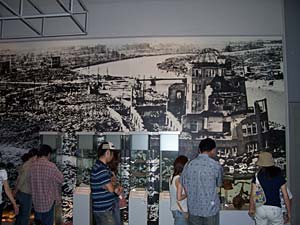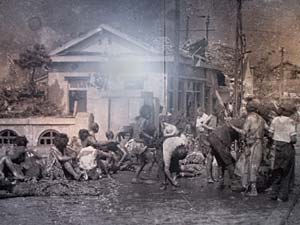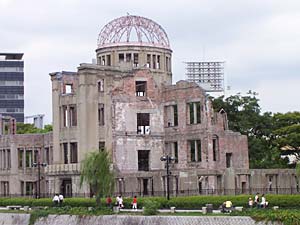 |
Return to index... |
Where the Living Envied the DeadHiroshima, Japan"... What America did by dropping bombs on Japan is quite tantamount to what Hitler did to Jews. We, the people of the world, have not yet indicted America." - Takagi, Fuji, The Japan Times, August 24, 2005 I was surprised to learn new details. Tromping historical grounds is like reading a book that you've written yourself: you expect nothing surprising in it, you believe you know all the secrets, all the twists and turns, before you open it up.
Hiroshima, I find, was very much a military target. It had been the shipping point of men and material for several generations, seeing troops embarking for the Sino-Japanese war, the Boxer Rebellion, and the war in Manchuria during World War One long before the great waves of soldiers that departed there during the Second World War. It was the home of the Japanese Army's Fifth Division, with sprawling military buildings and shipyards. Hiroshima was the only city on the 'target list' for the Atom Bomb that did not contain allied prisoners of war. Hiroshima expected air attacks. I learn that in the months preceding The Attack over 20,000 children were removed from the city for their safety. I learn that the city had taken over hundreds of private homes so that they could be taken down to provide fire lanes to help contain the inevitable fires that aerial bombing produced. Hiroshima was poised to receive the entire Central War Offices if Tokyo fell. As you wind through the Hiroshima Peace Memorial Museum, you quickly realize that this is not a stroll for the faint of heart. You see a thirty-foot-long photograph of the ruined city, stretching across an entire wall.
I find myself overwhelmed; I feel the inner pressures of emotion beginning to well up in my chest, my face. For here I see the human face on this story we have known for so long, this story without twists or turns. This is human tragedy at its most horrific, on the walls and in the display cases, for all to see and contemplate. I look at the faces around me, the same features, the same black hair, and I look at the little children, the same features, the same hair as those thirteen-year-olds... I think of my own girls, and wildly of whatever in the world I could ever do to save them from such a fate... I have to turn away, and find myself wiping a tear from my cheek. Mildly embarrassed, I continue on. "Some of us consider the bomb in the same category as poison gas and were against its use on a civilian population. Others were of the opinion that in total war, as carried on in Japan, there was no difference between civilians and soldiers, and that the bomb itself was an effective force tending to end the bloodshed, warning Japan to surrender and thus to avoid total destruction. It seems logical that he who supports total war in principle cannot complain of a war against civilians. The crux of the matter is whether total war in its present form is justifiable, even when it serves a just purpose. Does it not have material and spiritual evil as its consequences, which far exceed whatever good, might result? When will our moralists give us a clear answer to this question?" - Father Siemes of Hiroshima, in report to the Holy See in Rome, 1947. (From John Hersey's book, Hiroshima)
So the moralists have yet to give us a clear answer; for myself, I will continue to believe in the justification for dropping the bombs. But I will never, ever think of it again without a corresponding sense of responsibility, empathy, and horror. It remains the most inhumane act that humankind has ever enacted on its own. I called my family this morning. When I spoke to my father - he who had rushed in 1945 to enlist, right out of high school, and would have probably been involved in any invasion of Japan - I told him of my experiences at Hiroshima. He listened silently as I expressed a truncated version of these thoughts and emotions. When I finally paused, he expressed an entire generations voice in the great debate: "Yup, yup Dons, and we can invite them to Pearl Harbor, too... " |


